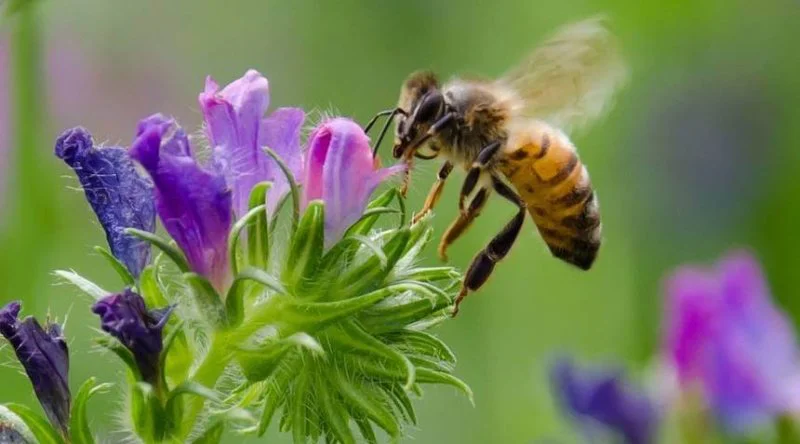Microscopic algae diet could help honeybees fight off deadly pathogens and other threats
Microscopic algae diet could help honeybees fight off deadly pathogens and other threats


A microscopic algae (“microalgae”) could provide a complete and sustainably sourced supplemental diet to boost the robustness of managed honey bees, according to research just published by Agricultural Research Service scientists in the journal Apidologie.
Poor nutrition in honey bees is often an underlying factor in colony losses because malnutrition amplifies the detrimental effects of parasites, pathogens, and pesticides. Habitat loss, decreases in flowering plant diversity and large tracts of crop monoculture (cultivation of a single crop over a large area) all can potentially contribute to lessening natural pollen sources, which provide bees essential nutrition.
Now, research by ARS entomologists Vincent Ricigliano and Michael Simone-Finstrom has shown that the microalgae Arthrospira platensis (commonly called spirulina) has a nutritional profile that closely resembles pollen. Spirulina is a part of family of blue-green algae, which are single-celled organisms that exist individually or in chains or groups.
Ricigliano and Simone-Finstrom found that spirulina is rich in essential amino acids and lipids required by bees, with levels matching those found in tested pollen samples.
The two scientists are both with the ARS Honey Bee Breeding, Genetics, and Physiology Research Laboratory in Baton Rouge, Louisiana.
“Our work is a pioneering first look into the nutritional and functional properties of a single microalga and how well it corresponds to what is needed in a complete pollen substitute for the honey bee,” explained Ricigliano.
In addition to being rich in essential amino acids necessary for protein synthesis, immune function and colony growth in honey bees, spirulina also contains prebiotics that support the growth of healthy gut bacteria.
Commercial beekeepers have become increasingly reliant on artificial pollen substitute diets to nourish colonies during periods of pollen scarcity as well as to bolster colony size before they fulfill pollination service contracts.
Currently available commercial diets for bees usually incorporate a variety of ingredients such as soy, yeast, wheat, lentils and milk proteins in an effort to supply balanced nutrition. These artificial diets are sometimes deficient in essential macronutrients (proteins, lipids, prebiotic fibers), micronutrients (vitamins, minerals), or antioxidants.
“So the need to scientifically improve the efficacy of pollen substitutes can be considered vital to modern beekeeping and we need to think about how we can do it in a sustainable way,” Ricigliano said.
Microalgae can be sustainably grown on a large scale with a minimal amount of water and few chemical inputs. It can even be grown in places where soybeans and other crops cannot be grown.
“All it takes are shallow ponds, nutrient salts and sunlight to produce highly nutritious microalgae,” said Ricigliano.
Now, the researchers are testing the microalgae diet in a field setting to make sure the diet is attractive to bees and supports colony growth. The excellent nutrition profile of spirulina suggests that there are likely other microalgae that could serve honey bees well, Simone-Finstrom pointed out.
“We have also begun development of new microalgae strains to address other aspects of bee health, including targeted nutrition strategies,” Ricigliano added.
Read the original article

 | Videos | More... |

Video: Nuclear energy will destroy us? Global warming is an existential threat? Chemicals are massacring bees? Donate to the Green Industrial Complex!
 | Bees & Pollinators | More... |

GLP podcast: Science journalism is a mess. Here’s how to fix it

Mosquito massacre: Can we safely tackle malaria with a CRISPR gene drive?

Are we facing an ‘Insect Apocalypse’ caused by ‘intensive, industrial’ farming and agricultural chemicals? The media say yes; Science says ‘no’
 | Infographics | More... |

Infographic: Global regulatory and health research agencies on whether glyphosate causes cancer
 | GMO FAQs | More... |

Why is there controversy over GMO foods but not GMO drugs?

How are GMOs labeled around the world?

How does genetic engineering differ from conventional breeding?
 | GLP Profiles | More... |

Alex Jones: Right-wing conspiracy theorist stokes fear of GMOs, pesticides to sell ‘health supplements’




 California, Washington, Oregon forge immunization alliance to safeguard vaccine access against federal undermining
California, Washington, Oregon forge immunization alliance to safeguard vaccine access against federal undermining Trust issues: What happens when therapists use ChatGPT?
Trust issues: What happens when therapists use ChatGPT? Fighting deforestation with CO2: Biotechnology breakthrough creates sustainable palm oil alternative for cosmetics
Fighting deforestation with CO2: Biotechnology breakthrough creates sustainable palm oil alternative for cosmetics Viewpoint — Fact checking MAHA mythmakers: How wellness influencers and RFK, Jr. undermine American science and health
Viewpoint — Fact checking MAHA mythmakers: How wellness influencers and RFK, Jr. undermine American science and health 30-year-old tomato line shows genetic resistance to devastating virus
30-year-old tomato line shows genetic resistance to devastating virus Viewpoint: Video — Big Solar is gobbling up productive agricultural land and hurting farmers yet providing little energy or sustainabilty gains
Viewpoint: Video — Big Solar is gobbling up productive agricultural land and hurting farmers yet providing little energy or sustainabilty gains The free-range chicken dilemma: Better for birds, but with substantial costs
The free-range chicken dilemma: Better for birds, but with substantial costs ‘You have to treat the brain first’:Rethinking chronic pain with Sanjay Gupta
‘You have to treat the brain first’:Rethinking chronic pain with Sanjay Gupta
